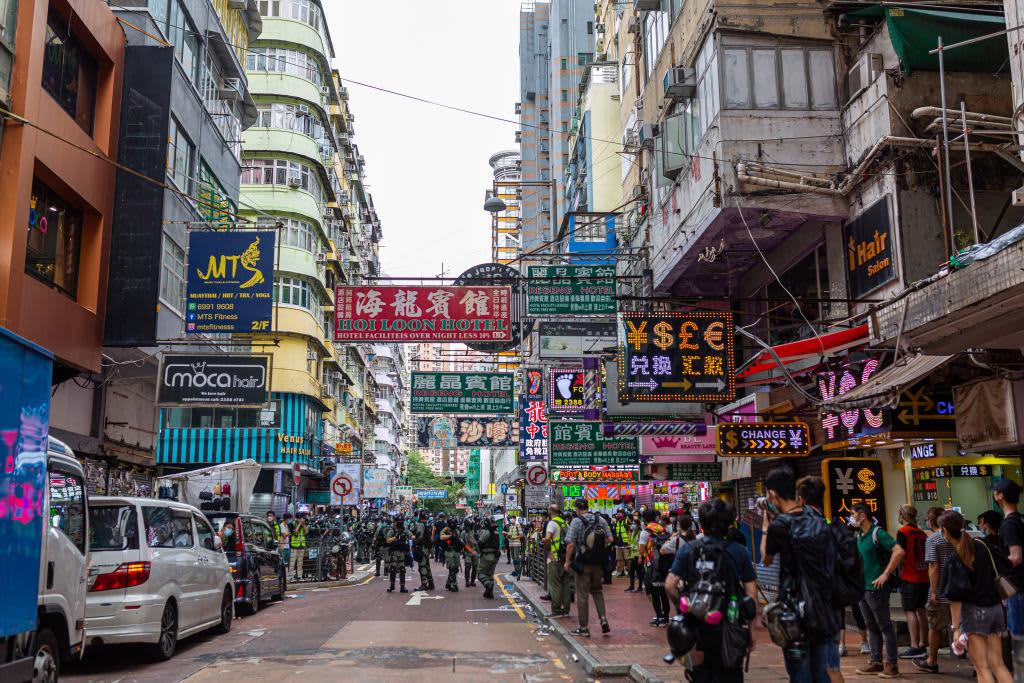
Hong Kong police control access to a street in the central Mongkok neighbourhood during the demonstrations. A new wave of protests rise in Hong Kong at the news that the Chinese government will unilaterally pass the National Security Law 23.
SOPA Images
Like most economies, Hong Kong should have a national security law — even if Beijing is the one imposing it on the city, a think tank said on Tuesday.
"There's a significant majority, particularly in the business community — which is more conservative, of course — that accepts that at some point, we should have a security law," said David Dodwell, executive director of the Hong Kong-APEC Trade Policy Group, a think tank.
The issue, said Dodwell, is not whether or not the city should have a security law, but what the exact content would be and how it would be implemented.
In fact, most economies have national security laws in place and Hong Kong was supposed to draft and enact one under the territory's mini constitution, the Basic Law, he noted.
Last month, Beijing approved a plan to institute a national security law in Hong Kong, bypassing the city's legislature. That raised concerns about China's increasing grip on the territory, which is governed under the "one country, two systems" principle. The structure grants the city a high level of autonomy for 50 years from 1997, when its sovereignty was transferred from the U.K. to China.
"It's a matter of regret for most of us that Hong Kong's administration has not been able, over these years, to get an appropriate law in place," Dodwell said. A previous attempt to introduce national security legislation in Hong Kong in 2003 was shelved after mass protests.
"But we need a security law. It's regrettable that Beijing has had to step in to do it. Now, we have to look at the content and the way in which they plan to implement (it) to make sure that the 'one country, two systems' (system) and the autonomies that we have are properly protected," he said.
Dodwell spoke on the one-year anniversary of a massive protest against a separate and now-withdrawn extradition bill that would have allowed people to be brought to mainland China for trial. Since then, Hong Kong has witnessed prolonged demonstrations and anti-government protests.
Anxieties about Hong Kong's future
After a lull earlier this year due to the coronavirus outbreak, the movement gained pace again due to Beijing's plans to impose the national security law and a bill passed last week that criminalizes disrespect of China's national anthem.
Dodwell said despite pervasive worries, the mainland authorities have, so far, not interfered with the freedom of expression and the right to protest peacefully in Hong Kong.
But the Hong Kong community has been anxious about how the former British colony's path would be charted after its sovereignty was handed over to China.
"A lot of the confidence that existed in Hong Kong through the transition in 1997 rested on an assumption that over the (next) 50 years, China would become to look more like Hong Kong than vice versa," he said.
Even though it's just 23 years in and that may become the case in the future, Dodwell said for now "clearly, China is not is not moving in the liberalizing direction that many people here in Hong Kong had expected and hoped for. I think that is a source of great anxiety for some."
Unlike the dumped extradition bill, Beijing probably will not budge its plans for implementing the national security law in Hong Kong.
"China has made it pretty clear for several months now that they have changed course on this. You might argue that they were reasonably restrained last year after the large marches, but not anymore," said Richard McGregor, a senior fellow at the Lowy Institute, an Australian think tank.
It has become "a lot more 'one country' and much less 'two systems.' And I think that's definitely going to be very tough for China's critics and opponents," McGregor told CNBC.
While some businesses have come out publicly to back the national security bill, McGregor said it was likely due to pressure from the establishment.
The public support, he said, is "not unusual in Chinese terms, it's pretty unusual for Hong Kong."
"Those companies are getting squeezed and you can see it," McGregor added.
On Tuesday, Hong Kong leader Carrie Lam said at her weekly press briefing that the city cannot tolerate any more chaos.
"All of us can see the difficulty we have been through in the past year, and due to such serious situations we have more problems to deal with," Lam said, according to a Reuters report. "We need to learn from mistakes, I wish all lawmakers can learn from mistakes — that Hong Kong cannot bear such chaos."
"need" - Google News
June 09, 2020 at 02:11PM
https://ift.tt/30p85oO
Hong Kong's business community sees the need for national security laws, says think tank - CNBC
"need" - Google News
https://ift.tt/3c23wne
https://ift.tt/2YsHiXz
Bagikan Berita Ini














0 Response to "Hong Kong's business community sees the need for national security laws, says think tank - CNBC"
Post a Comment